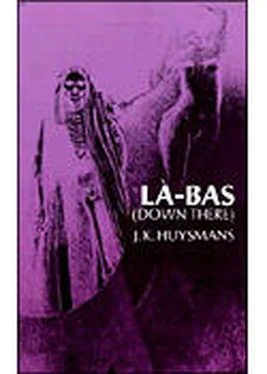Joris-Karl Huysmans - Down There (Là-Bas)
Здесь есть возможность читать онлайн «Joris-Karl Huysmans - Down There (Là-Bas)» весь текст электронной книги совершенно бесплатно (целиком полную версию без сокращений). В некоторых случаях можно слушать аудио, скачать через торрент в формате fb2 и присутствует краткое содержание. Жанр: Классическая проза, на английском языке. Описание произведения, (предисловие) а так же отзывы посетителей доступны на портале библиотеки ЛибКат.
- Название:Down There (Là-Bas)
- Автор:
- Жанр:
- Год:неизвестен
- ISBN:нет данных
- Рейтинг книги:3 / 5. Голосов: 1
-
Избранное:Добавить в избранное
- Отзывы:
-
Ваша оценка:
- 60
- 1
- 2
- 3
- 4
- 5
Down There (Là-Bas): краткое содержание, описание и аннотация
Предлагаем к чтению аннотацию, описание, краткое содержание или предисловие (зависит от того, что написал сам автор книги «Down There (Là-Bas)»). Если вы не нашли необходимую информацию о книге — напишите в комментариях, мы постараемся отыскать её.
Down There (Là-Bas) — читать онлайн бесплатно полную книгу (весь текст) целиком
Ниже представлен текст книги, разбитый по страницам. Система сохранения места последней прочитанной страницы, позволяет с удобством читать онлайн бесплатно книгу «Down There (Là-Bas)», без необходимости каждый раз заново искать на чём Вы остановились. Поставьте закладку, и сможете в любой момент перейти на страницу, на которой закончили чтение.
Интервал:
Закладка:
"It takes a month to hear all the reports. By letters-patent Jean de Malestroit establishes publicly the ' infamatio ' of Gilles, then, when all the forms of canonic procedure have been gone through with, he launches the mandate of arrest.
"In this writ of warrant, given at Nantes the 13th day of September in the year of Our Lord 1440, the Bishop notes all the crimes imputed to the Marshal, then, in an energetic style, he commands his diocese to march against the assassin and dislodge him. 'Thus we do enjoin you, each and all, individually, by these presents, that ye cite immediately and peremptorily, without counting any man upon his neighbor, without discharging the burden any man upon his neighbour, that ye cite before us or before the Official of our cathedral church, for Monday of the feast of Exaltation of the Holy Cross, the 19th of September, Gilles, noble baron de Rais, subject to our puissance and to our jurisdiction; and we do ourselves cite him by these presents to appear before our bar to answer for the crimes which weigh upon him. Execute these orders, and do each of you cause them to be executed.'
"And the next day the captain-at-arms, Jean Labbé, acting in the name of the duke, and Robin Guillaumet, notary, acting in the name of the Bishop, present themselves, escorted by a small troop, before the château of Mâchecoul.
"What sudden change of heart does the Marshal now experience? Too feeble to hold his own in the open field, he can nevertheless defend himself behind the sheltering ramparts-yet he surrenders.
"Roger de Bricqueville and Gilles de Sillé, his trusted councillors, have taken flight. He remains alone with Prelati, who also attempts, in vain, to escape. He, like Gilles, is loaded with chains. Robin Guillaumet searches the fortress from top to bottom. He discovers bloody clothes, imperfectly calcinated ashes which Prelati has not had time to throw into the latrines. Amid universal maledictions and cries of horror Gilles and his servitors are conducted to Nîmes and incarcerated in the château de la Tour Neuve.
"Now this part is not very clear," said Durtal to himself. "Remembering what a daredevil the Marshal had been, how can we reconcile ourselves to the idea that he could give himself up to certain death and torture without striking a blow?
"'Was he softened, weakened by his nights of debauchery, terrified by the audacity of his own sacrileges, ravaged and torn by remorse? Was he tired of living as he did, and did he give himself up, as so many murderers do, because he was irresistibly attracted to punishment? Nobody knows. Did he think himself above the law because of his lofty rank? Or did he hope to disarm the duke by playing upon his venality, offering him a ransom of manors and farm land?
"One answer is as plausible as another. He may also have known how hesitant Jean V had been, for fear of rousing the wrath of the nobility of his duchy, about yielding to the objurgations of the Bishop and raising troops for the pursuit and arrest.
"Well, there is no document which answers these questions. An author can take some liberties here and set down his own conjectures. But that curious trial is going to give me some trouble.
"As soon as Gilles and his accomplices are incarcerated, two tribunals are organized, one ecclesiastical to judge the crimes coming under the jurisdiction of the Church, the other civil to judge those on which the state must pass.
"To tell the truth, the civil tribunal, which is present at the ecclesiastical hearings, effaces itself completely. As a matter of form it makes a brief cross-examination-but it pronounces the sentence of death, which the Church cannot permit itself to utter, according to the old adage, ' Ecclesia abhorret a sanguine .'
"The ecclesiastical trial lasts five weeks, the civil, forty-eight hours. It seems that, to hide behind the robes of the Bishop, the duke of Brittany has voluntarily subordinated the rôle of civil justice, which ordinarily stands up for its rights against the encroachments of the ecclesiastical court.
"Jean de Malestroit presides over the hearings. He chooses for assistants the Bishops of Mans, of Saint Brieuc, and of Saint Lô, then in addition he surrounds himself with a troop of jurists who work in relays in the interminable sessions of the trial. Some of the more important are Guillaume de Montigné, advocate of the secular court; Jean Blanchet, bachelor of laws; Guillaume Groyguet and Robert de la Rivière, licentiates in utroque jure , and Hervé Lévi, senescal of Quimper. Pierre de l'Hospital, chancellor of Brittany, who is to preside over the civil hearings after the canonic judgment, assists Jean de Malestroit.
"The public prosecutor is Guillaume Chapeiron, curate of Saint Nicolas, an eloquent and subtile man. Adjunct to him, to relieve him of the fatigue of the readings, are Geoffroy Pipraire, dean of Sainte Marie, and Jacques de Pentcoetdic, Official of the Church of Nantes.
"In connection with the episcopal jurisdiction, the Church has called in the assistance of the extraordinary tribunal of the Inquisition, for the repression of the crime of heresy, then comprehending perjury, blasphemy, sacrilege, all the crimes of magic.
"It sits at the side of Jean de Malestroit in the redoubtable and learned person of Jean Blouyn of the order of Saint Dominic, delegated by the Grand Inquisitor of France, Guillaume Merici, to the functions of Vice Inquisitor of the city and diocese of Nantes.
"The tribunal constituted, the trial opens the first thing in the morning, because judges and witnesses, in accordance with the custom of the times, must proceed fasting to the giving and hearing of evidence. The testimony of the parents of the victims is heard, and Robin Guillaumet, acting sergeant-at-arms, the man who arrested the Marshal at Mâchecoul, reads the citation bidding Gilles de Rais appear. He is brought in and declares disdainfully that he does not recognize the competence of the Tribunal, but, as canonic procedure demands, the Prosecutor at once 'in order that by this means the correction of sorcery be not prevented,' petitions for and obtains from the tribunal a ruling that this objection be quashed as being null in law and 'frivolous.' He begins to read to the accused the counts on which he is to be tried. Gilles cries out that the Prosecutor is a liar and a traitor. Then Guillaume Chapeiron extends his hand toward the crucifix, swears that he is telling the truth, and challenges the Marshal to take the same oath. But this man, who has recoiled from no sacrilege, is troubled. He refuses to perjure himself before God, and the session ends with Gilles still vociferating outrageous denunciations of the Prosecutor.
"The preliminaries completed, a few days later, the public hearings begin. The act of indictment is read aloud to the accused, in front of an audience who shudder when Chapeiron indefatigably enumerates the crimes one by one, and formally accuses the Marshal of having practised sorcery and magic, of having polluted and slain little children, of having violated the immunities of Holy Church at Saint Etienne de Mer Morte.
"Then after a silence he resumes his discourse, and making no account of the murders, but dwelling only on the crimes of which the punishment, foreseen by canonic law, can be fixed by the Church, he demands that Gilles be smitten with double excommunication, first as an evoker of demons, a heretic, apostate and renegade, second as a sodomist and perpetrator of sacrilege.
"Gilles, who has listened to this incisive and scathing indictment, completely loses control of himself. He insults the judges, calls them simonists and ribalds, and refuses to answer the questions put to him. The Prosecutor and advocates are unmoved; they invite him to present his defence.
"Again he denounces them, insults them, but when called upon to refute them he remains silent.
Читать дальшеИнтервал:
Закладка:
Похожие книги на «Down There (Là-Bas)»
Представляем Вашему вниманию похожие книги на «Down There (Là-Bas)» списком для выбора. Мы отобрали схожую по названию и смыслу литературу в надежде предоставить читателям больше вариантов отыскать новые, интересные, ещё непрочитанные произведения.
Обсуждение, отзывы о книге «Down There (Là-Bas)» и просто собственные мнения читателей. Оставьте ваши комментарии, напишите, что Вы думаете о произведении, его смысле или главных героях. Укажите что конкретно понравилось, а что нет, и почему Вы так считаете.












